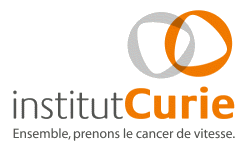
The web supplement to
Aurélie Chiche et al. 2016



|
|


|
| P53 deficiency induces cancer stem cell pool expansion in a mouse model of triple negative breast tumors |
| Aurélie Chiche1, Mejdi Moumen1, Mathilde Romagnoli1, Valérie Petit1, Hamza Lasla2, Pascal Jézéquel2, Pierre de la Grange3, Jos Jonkers4, Marie-Ange Deugnier1,5, Marina A. Glukhova1,5, Marisa M. Faraldo1,5 |
|
Authors’Affiliations: 1Institut Curie, PSL Research University, CNRS, UMR144, Paris, F-75248, France; 2Institut de Cancérologie de l'Ouest, Bvd Jacques Monod, 44805 Saint Herblain, France; 3GenoSplice Technology, iPEPS - ICM, Hopital Pitié Salpetriere, 75013 Paris, France; 4Division of Molecular Pathology and Cancer Genomics Centre Netherlands, The Netherlands Cancer Institute, Amsterdam, The Netherlands; 5Institut national de la santé et de la recherche médicale, Paris, France. |
|
Abstract Triple-negative breast cancer is a heterogeneous disease characterized by the expression of basal cell markers, no estrogen or progesterone receptor expression and a lack of HER2 overexpression. Triple-negative tumors are often associated with activated Wnt/b-catenin signaling and most of them present impaired p53 function. To study the interplay between p53 loss and Wnt/b-catenin signaling in stem cell functions and tumorigenesis, we deleted p53 from the mammary epithelium of K5DNbcat mice displaying a constitutive activation of Wnt/b-catenin signaling in basal cells. The K5DNbcat transgenic mice exhibit amplification of the basal stem cell pool and develop triple-negative mammary carcinomas. We found that the loss of p53 in K5DNbcat mice induced precocious expansion of mammary stem/progenitor cells and accelerated formation of triple-negative tumors. Notably, p53-deficient tumors expressed high levels of integrins and extracellular matrix (ECM) components and were enriched in cancer stem cells. In addition, they overexpressed the tyrosine kinase receptor Met, a characteristic associated with human triple-negative breast tumors. Inhibition of the Met kinase activity impaired tumorsphere formation, indicating the requirement of Met signaling for cancer stem cell growth in this model. Importantly, human basal like breast cancers with predicted mutated p53 status express higher MET levels than tumors with wild-type p53. Taken together, these results connect p53 loss and b-catenin activation to stem cell regulation and tumorigenesis in triple-negative cancer and highlight the role of Met signaling in maintenance of cancer stem cell properties, providing new cues for targeted therapies. |
| Download data: | ||
| Affymetrix Raw data (cel files) | Get them (.zip) | |
| Affymetrix description (xls file) | Get them (.xls) | |
| NanoString Raw data (cel files) | Get them (.zip) | |
| NanoString description (xls file) | Get them (.xls) |
|
Last modified Warning: date(): It is not safe to rely on the system's timezone settings. You are *required* to use the date.timezone setting or the date_default_timezone_set() function. In case you used any of those methods and you are still getting this warning, you most likely misspelled the timezone identifier. We selected the timezone 'UTC' for now, but please set date.timezone to select your timezone. in /http/hosted/microarrays.curie.fr/html/publications/package_php/util.inc on line 35 March 10 2016 15:11:57 |